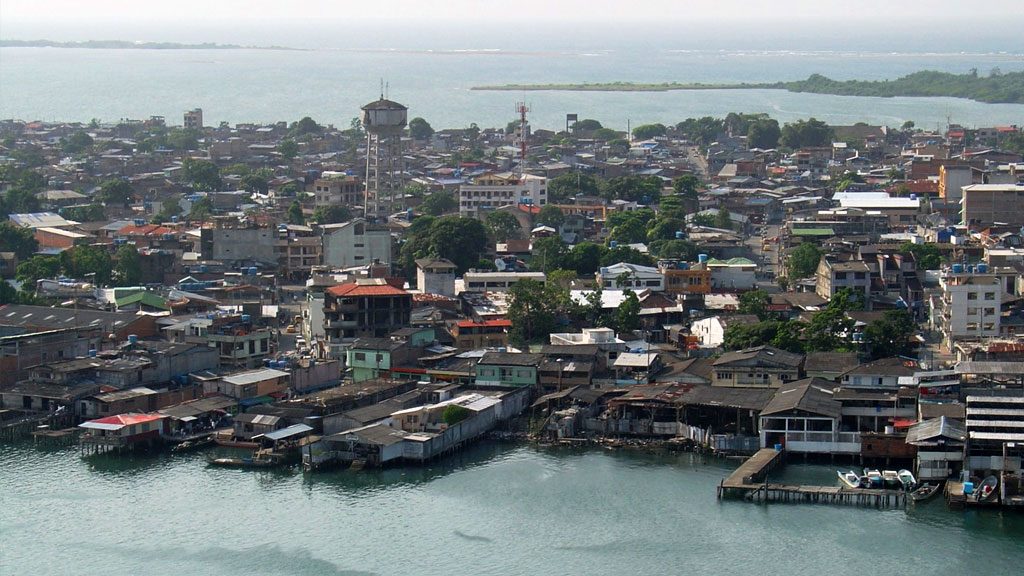The southwestern Colombian port city of Tumaco woke up from a traumatic night on Thursday morning after a number of alleged FARC attacks both inside and outside the city.
According to local media reports, a total of six explosions were registered while security forces were engaged in combat in the rural part of the country’s most southwestern municipality.
Bombs went of in four different parts of the city after which locals reported gunfire, presumably between security forces and FARC rebels, who have increased their attacks in the southwest of the country after suspending a unilateral ceasefire.
The explosions were registered in at least three different neighborhoods. One targeted the local Navy base, another targeted a marine patrol in the southern part of the city.
According to local media, alleged FARC guerrillas also threw an explosive at an ambulance carrying two injured in what the local hospital director called as a possible accident, implying the guerrillas could have mistaken the sirens of the ambulance with those of a police vehicle.
The driver of the ambulance fortunately was able to avoid a crash, but one of the medics on board the ambulance was mildly injured, hospital director Lucia Castillo told Noticias Caracol.
In one of the urban attacks, a bus was reportedly damaged.
The area around the city has been the scene of heavy fighting between the the FARC and security forces who are trying to clear an area where the rebels on Tuesday bombed an electricity tower that has since left part of the town without electricity.
The fighting has left the city virtually disconnected from the rest of the country for days.
Citizens of southwest Colombia port city trapped as FARC ups offensive
In the meantime, repairmen are unable to restore electricity until the military has cleared the vicinity of the tower of possible landmines.
The conflictCausesInequalityPolitical exclusionWeak, corrupt stateViolence aggravatorsDrug traffickingInternational actorsFact sheetPeace talksProfileFARC |
The FARC has focused its military actions in the southwest of Colombia in retaliation of the bombing of 26 rebels in a municipality some 80 miles north of Tumaco two weeks ago.
FARC suspends unilateral ceasefire after military air strike kills at least 26 guerrillas
Since then, guerrillas have taken to the offensive in Tumaco and the more northern Pacific port city of Buenaventura that spent Monday to Thursday without electricity after guerrillas on Sunday bombed an electricity tower just south of the city.
The increased violence of the past few weeks followed five months of relative calm as the FARC since December upheld a unilateral ceasefire which in effect decreased war-related violence throughout Colombia with 90%.
The rebels had called the ceasefire to push forward ongoing talks with the government about ending the FARC’s 51-year-long war against the state.
However, a FARC attack killing 11 soldiers in mid April spurred a chain reaction that undid efforts to deescalate the armed conflict for the duration of the talks.
Norway and Cuba, the guarantor countries of the peace talks, have since called on both the FARC and the government to agree to a bilateral ceasefire which has been negotiated since December, but has failed to result in a cessation of military activity.
The talks, hosted in Cuba, have been ongoing since 2012 and have since produced partial accords on the rebels’ participation in politics, their abandonment of drug trafficking activities and a far-stretching rural reform that seeks to curb inequality on the countryside that is widely seen as one of the main causes of the conflict.
However, as both parties are discussing how to assume responsibility for the 7 million victims of the conflict, and how to eventually apply transitional justice for the tens of thousands of war crimes committed by both warring parties, the talks seemed to have stalled while popular skepticism about a possible positive outcome of the talks has increased.


